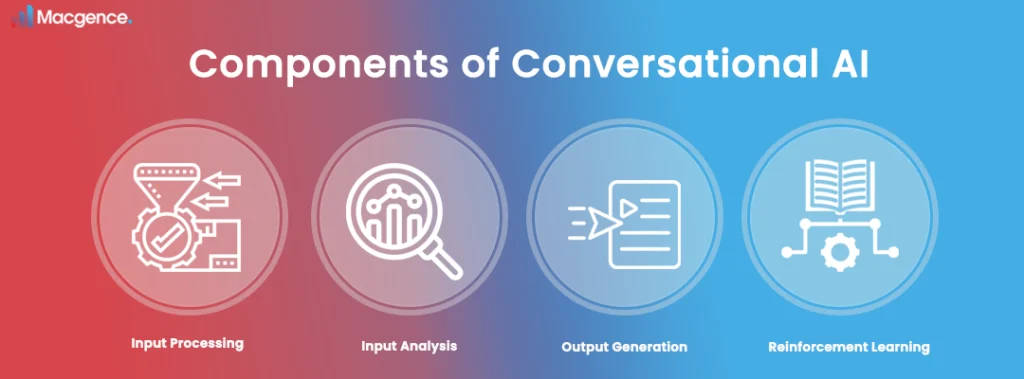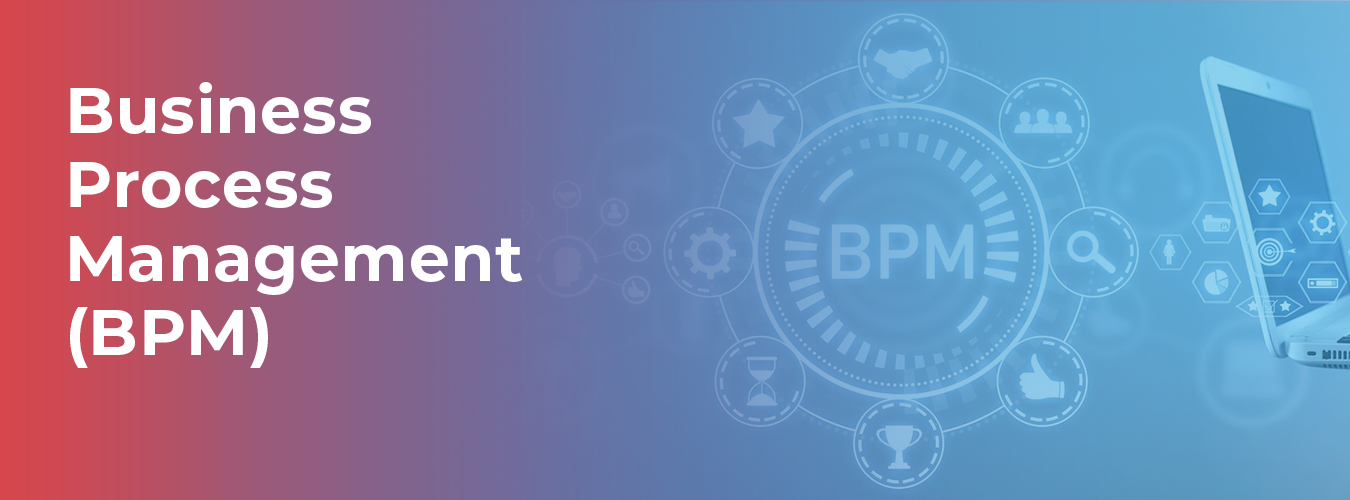Conversational artificial intelligence (AI) solutions belong to a suite of rapidly evolving technologies. In 2023, the best conversational AI platforms are multifaceted. On one level, they engage intelligently and sensitively with customers; on another, they triage customer concerns and escalate complex issues to trained employees. Additionally, sentiment analysis is a conversational AI tool that can identify a customer’s feelings surrounding a product or an interaction. In this blog, we will look into its understanding, its working, components, how to implement it, its benefits, vast use cases, and data services by Macgence to help you out.
What is Conversational AI?
It is a set of technologies, like chatbots and virtual assistants, that allows machines to process, recognize, and respond clearly to text or voice inputs. They use high volumes of data, Machine Learning (ML), and Natural Language Processing (NLP) to apprehend speech and textual inputs, decipher numerous languages, and respond in a way that mimics human conversation.
When building a successful Conversational application, it’s crucial to integrate context, personalization, and relevance within the interaction between computer and human. Moreover, Conversational Design is a discipline that uses principles based on human-to-human interaction to design flows that sound and feel natural to users when interacting with a conversational AI solution.
How does Conversational AI work?
Conversational AI solutions combine several technologies, including ML, NLP, Automated Speech Recognition (ASR), and natural language understanding (NLU), to process each written or spoken word and figure out the best way to respond and learn to get better from every user interaction. Conversational Intelligence software applications are changing how businesses interact with customers, enhancing responsiveness and personalization.
Components of Conversational AI

It consists of four key steps: input processing, input analysis, output generation, and reinforcement learning. Unstructured data is transformed into a machine-readable format, which is then analyzed to generate and give an appropriate response. Over time, the underlying ML algorithms learn and improve the quality of response. These four steps are further detailed below:
Input Processing
First, a user provides text or voice input through a website or an application. Automatic speech recognition (ASR), also known as speech recognition, converts spoken words into text to be read by the computer.
Input Analysis
Next, the conversation engine will use NLP to decipher the meaning and derive the text’s intent.
Output Generation
During this step, the application formulates a response based on intent using Dialog Management. Further, natural language generation (NLG), a part of NLP, orchestrates and converts the response into a human-understandable format.
Reinforcement Learning
Finally, ML algorithms learn from experience and refine responses over time to provide a better response.
How Conversational AI Helps Brands and Customers
Delivering exceptional customer experience is the key to lasting success for any brand. But the on-ground realities often need to live up to this age-old wisdom. Many businesses continue to be plagued by the same customer experience issues, adversely impacting their brand.
To begin with, it often takes too long for customers to get hold of a customer care representative on the phone or through email. This is a frustrating experience for a customer, particularly one requiring instant assistance. To make matters worse, even when a support agent does come online, they cannot dedicate much time and attention to solving a customer’s problem. In some cases, they may even lack the knowledge and competence to do so.
These problems stem from the conventional customer support model, which relies heavily on contact centers staffed by human agents. These support agents can only help a few customers daily and spend much time resolving the same routine, repetitive queries. This leaves them needing more time and attention to help customers face more complex issues.
What are the benefits of Conversational AI?

Conversational AI solutions enable you to meet the customers’ needs and address their requests while reducing costs and efforts. Here are some of the significant benefits of Conversational AI:
Accessibility
Unlike other forms of interaction, conversations are the preferred medium for people with diverse technical knowledge and physical abilities. Applications based on conversational user interfaces could be a technological gateway to various audiences.
Ease of Use
Conversing is a natural, easy, and quick way for customers to interact with a business, eliminating the tedious tasks of searching, clicking, and swiping to find what they need.
Increased sales and engagement
Conversational AI solutions permit corporations to provide real-time data to their end customers, leading to advanced customer experience, elevated customer loyalty, and extra sales via referrals.
Personalization
Conversational AI chatbots will have one-on-one interactions with clients, providing personalized tips based on the consumer’s past interactions or even cross-selling products that the user might also pick.
Cost efficiency
Conversational AI solutions can relieve a company’s employees of mundane, repetitive tasks, thus directing human capital to the places it needs. This benefit can be a critical time-saver for human resources (HR) professionals and healthcare administrators.
What are the use cases of Conversational AI?
People frequently have online chatbots and voice assistants in their thoughts when discussing Conversational AI solutions. Most conversational AI apps have state-of-the-art algorithms built into their backend to ensure they provide human-like experiences. While an AI-powered voice assistant is the most popular utility, there are many instances of its use across numerous industries.
CUSTOMER SUPPORT
Businesses use Conversational AI solutions to answer frequently asked questions (FAQs), offer customized hints, cross-sell or upsell products, and enhance customers’ experience throughout the sales cycle. Some of the examples include messaging bots on e-commerce sites and automated tasks performed by virtual assistants.
BANKING AND FINANCE
Repetitive tasks like gathering and processing data can be automated using conversational banking solutions, improving customer engagement and understanding customers’ likes and dislikes. Banks seek automated solutions to provide quick and seamless financial assistance to their customers. With Macgence’s AI-build Conversational AI solutions, you can enable the digital transformation of your financial business.
RETAIL AND COMMERCE
Whether a customer is at home, in-store, or waiting in line for a cup of coffee, retail conversational solutions deliver a personalized multichannel experience to help them get things on the move. From navigating an e-commerce website to placing orders on a mobile app, Conversational AI solutions make it easy for your customers to quickly find what they are looking for. For instance, AI assistants can help users navigate different categories, find specific products, and even place orders, boosting business conversion rate and revenue.
HEALTHCARE
From gathering patients’ data for pattern recognition to performing accurate diagnostics, contextual AI assistants can automate many healthcare tasks. For example, Conversational AI solutions for medical assistance can help patients choose the right health plan, schedule appointments, ask questions regarding medication, and more, reducing human intervention and response time.
How Can Macgence Data Deliver A Range Of Benefits For Conversational AI?
Macgence allows you to focus time on developing the next generation of technologies while swiftly establishing a dependable data pipeline to support your conversational AI models. Our Conversational AI solutions and quality methodologies work together to provide the high-quality data you require to develop accurate AI models. Each client engagement is tailored to your unique use case. We ensure our clients obtain training data that meets the quality standards.
The benefits and possible uses of conversational AI may grow across several industries as technology develops. Macgence offers high-quality data that helps you expand.
Personalization
We offer personalized data based on user preferences, history, and behavior, providing a tailored experience for each project.
Scalability
Our comprehensive data can scale the Conversational AI solutions to handle a growing user base and increased demand without affecting performance.
Security and Compliance
We adhere to robust security standards and compliance with data protection regulations. With us, any user doesn’t have to worry about the privacy and security of data. We adhere to ISO-27001, GDPR & HIPAA standards.
Customization and Flexibility
Our well-tailored Conversational AI solutions provide the flexibility to customize the data to meet specific business needs and the unique characteristics of each application.
Transparent Communication
We follow clear and transparent communication about the capabilities and limitations of the data we offer to clients and users.
Explore The Data Services By Macgence For Conversational AI
Our ready-to-use AI training data helps your conversational AI models in the following ways.
Speech Data Transcription
Essential for voice solutions, our multilingual speech transcription services provide exceptional transcriptions, elevating human experiences and enabling top-notch communication solutions across diverse languages.
Data Collection
Since data is essential to the success of any project, AI teams dedicate most of their time to preparing Conversational AI solutions for AI models. Thus, we provide customized and shelf (Readymade) data for your conversational AI models.
Text Annotation
Search engines, chatbots, virtual assistants, automatic speech recognition (ASR) systems, and other applications employ text annotation to your algorithms. We guarantee accuracy and ensure the AI model is successful in its intended use.
Conclusion
Large volumes of speech and text data are essential to train conversational AI models. The machine learns how to process human language using this data. The system then engages in natural human interaction using this knowledge. But, one of the main issues affecting the user experience in the conversational AI market is the imprecision of chatbots and virtual assistants. Therefore, tailored and accurate data is essential. Macgence provides precise and high-quality Conversational AI solutions to support the success of AI applications. Macgence allows you to focus time on developing the next generation of technologies while swiftly establishing a dependable data pipeline to help your conversational AI models. Our qualified staff and quality methodologies work together to provide the high-quality data you require to develop accurate AI models. Each client engagement is tailored to your unique use case. We ensure our clients obtain training data that meets the quality standards.
FAQs
Ans: – A conversational AI approach refers to a business’s plan or techniques to leverage conversational AI technology to achieve its goals effectively. It involves defining how conversational AI may be included in the general business approach and how it will beautify client experiences, optimize workflows, and enhance business performance.
Ans: – Understanding that building a conversational AI may be complicated and iterative is crucial. It requires information in NLP, ML, and software engineering.
Ans: – NLP is just like the language skills of conversational AI. As humans recognize and respond to language, NLP enables AI systems to identify and engage with human language.




